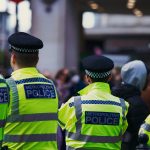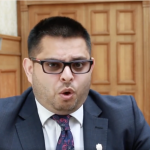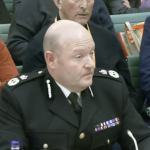Today, James Cleverly, the Home Secretary, has announced several proposed amendments to the Criminal Justice Bill, in a clear and targeted rebuke to anti-Israel marchers deliberately causing disruption in London and outraging the public over behaviour at war memorials and launching fireworks at police.
Mr Cleverly has proposed the following changes to the Criminal Justice Bill:
- Creating a new offence of desecrating a war memorial punishable by up to three months’ imprisonment and a fine of up to £1,000;
- Creating a new offence which would make it illegal for someone to have a pyrotechnic article in their possession during a procession or assembly. Offenders could receive a fine of up to £1,000;
- Providing the police with new powers to arrest protesters wearing face coverings to conceal their identity. Offenders could receive a fine of up to £1,000 and a month in prison;
- Modifying the reasonable excuse defence that is currently available concerning certain public order offences to prevent a minority of protesters from deliberately causing serious disruption while exploiting defences relating to the right to protest.
Our Demonstration and Event Monitoring Unit has for months observed protesters causing severe disruption to the public during their weekly anti-Israel demonstrations, including launching fireworks at police officers; desecrating war memorials; and preventing members of the public from travelling.
A further effect of these weekly protests is that a staggering 90% of British Jews say that they would avoid travelling to a city centre if a major anti-Israel demonstration was taking place there. Our urban centres have become no-go zones for Jews.
In December, Campaign Against Antisemitism gave evidence to the Home Affairs Select Committee regarding the policing of protests. During the hearing, Chief Executive Gideon Falter pointed out that there is no freedom to intimidate others, glorify terrorism or commit acts of hatred under the law, and contrasted how police at the March Against Antisemitism in November were there to protect marchers from criminality, whereas at the weekly anti-Israel marches they are there to protect the public from criminals among the marchers.
James Cleverly, the Home Secretary, said: “Recent protests have seen a small minority dedicated to causing damage and intimidating the law-abiding majority. The right to protest is paramount in our county, but taking flares to marches to cause damage and disruption is not protest, it is dangerous. That is why we are giving police the powers to prevent any of this criminality on our streets.”
National Police Chiefs’ Council Lead for Public Order, Chief Constable BJ Harrington, said: “We welcome the proposal to create new offences relating to war memorials and flares, as well as making it clear that covering your face at a protest to conceal identity is not acceptable.
“These changes are in-line with conversations that we have had with the Home Office to ensure that we have the powers that we need to get balance right between the rights of those who wish to protest, and those impacted by them.
“Thankfully, the use of flares and pyrotechnics at public order events is rare, but they are still extremely dangerous. Safety is our number one concern when policing these events, and the effective banning of these items during protests can only help in our mission to ensure that they take place without anyone coming to any harm.
“As with all policing powers, these new powers will be used when appropriate, proportionate, and necessary to achieve policing objectives. Policing is not anti-protest, but there is a difference between protest and criminal activism, and we are committed to responding quickly and effectively to activists who deliberately disrupt people’s lives with reckless and criminal acts.”
Andy Marsch, Chief Constable at the College of Policing, said: “I welcome the new offences this legislation will provide the officers who are policing protests and working hard, in complex environments, to keep people safe.
“The safety of both those protesting and others nearby trying to go about their business is the top priority and our training and guidance focuses on balancing the rights of those protesting with the rights of those affected. The new legislation is now clear that protest is not an excuse for serious disruption.
“As with previous changes the College of Policing will work quickly to provide practical advice, training and support for policing to utilise these new powers.”
Stephen Silverman, Director of Investigations and Enforcement at Campaign Against Antisemitism, said: “For months now, we have been asking for tougher restrictions to be placed on these protests, which have made our urban centres no-go zones for Jews. While the police have failed the Jewish community and law-abiding Londoners, the Government, to its credit, is listening. These new laws will help address the mob mentality that we have observed in these protests, including the use of fireworks against police officers, desecration of war memorials and severe disruption to travel. There is no justification for such scenes, and now, there will be no legal defence. The people of this country expect the lawlessness on our streets to be brought firmly under control, and with these changes there are now even fewer excuses for police inaction.”








